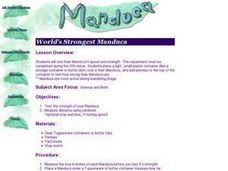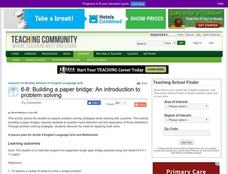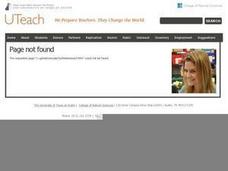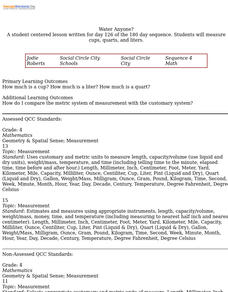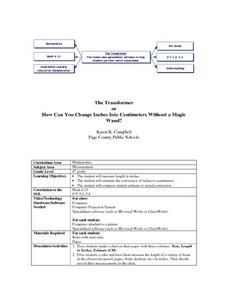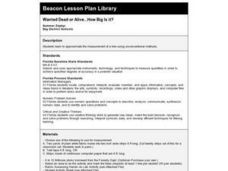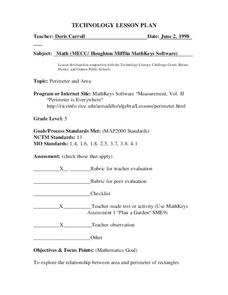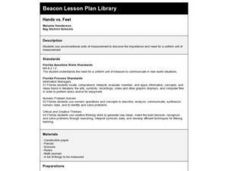Curated OER
I Can Use a Worm to Count
Kindergarteners use worms, puppets or other props to practice counting to 100. First, they listen to a read aloud of Count Worms by Roger Hargeaves. A worm pattern is used to count to 100, with each segment of the worm representing a...
Curated OER
Mean, Median, Mode, Range
Learners engage in a study of mean, median, mode, and range in order to represent data in tables. They are also exposed to the results of data that is skewed because of the outlier.
Curated OER
World's Strongest Manduca
Young scholars test the strength and speed of their Manduca. They keep their insect in a small dish and wiegh it down with pennies. They share their observations with the class.
Curated OER
Tick Around the Clock
Learners examine and discuss the differences between clocks they are shown. Using the internet, they research how people used to tell time before clocks. They review what the long and short hand on the clock represent and practice...
Key Curriculum Press
Lesson 10.2 Volume of Prisms and Cylinders
Tenth graders investigate volume in class and in the real world. They explore volume of cylinders and prisms as it relates to different subjects. Pupils also investigate how important volume is in different career field.
Curated OER
Building a Paper Bridge: an Introduction To Problem Solving
Eighth graders explore problem solving strategies to build a paper bridge with a partner. As a class they discuss a variety of techniques to solve a simple problem, then in pairs construct the longest non-supported single span bridge...
Futures Channel
Folding Circles
Students investigate properties of circles. In this geometry lesson, students differentiate between similarity and congruence as they observe polygons. They investigate properties of two and three dimensional shape.
Curated OER
Sequencing From Close To Far
Students explore how objects stay the same size and only "look" like they change when closer are farther from the object. They sequence aerial photos and satellite images from closest to farthest.
Curated OER
Building a Telescope
Students construct a simple refracting telescope. They calculate the magnification.
Curated OER
Cap-It to the Max
Eighth graders compare the volume of three cylinders constructed from the same size sheet of paper. They use concrete and graphical models to derive formulas for finding perimeter, circumference, area, and volume of two and three...
Alabama Learning Exchange
Origami Geometry
Origami is an excellent way to combine Japanese culture, art, and geometric shapes into one engaging instructional activity! Scholars begin by listening to the story Sadako and the Thousand Paper Cranes and learn the origin of the...
Curated OER
How Tall in the Fall?
First graders use nonstandard measurement to measure. After reading Inch by Inch, 1st graders pair measure leaves that they have collected. They glue their leaves onto tag board to make a display.
Curated OER
The Transformer
Fourth graders practice measuring different objects in inches. Individually, they estimate the length of the same object in centimeters and then calculate the actual length. They compare and contrast their estimate to the actual length...
Curated OER
Multiplying and Dividing Fractions with Post It Notes
Seventh graders experiment with measurement as it relates to the algorithm for dividing fractions. In this fractions lesson, 7th graders work in groups to establish how many post-it notes it takes to fill an 8 X 11 piece of paper. Using...
Curated OER
The Box with the Greatest Volume
Pupils use measurement tools to measure the nearest 16th of an inch. They connect fractions and their decimal equivalents and compare this with other decimals. Finally, the class uses algebraic concepts and formulas to solve problems.
Curated OER
String of Fish
Fourth graders research a Florida fish to determine its length. They display this information on two index cards, which are cut to the shape of the head and the tail and attached to a string that they measure and cut to the correct...
Curated OER
Wanted Dead or Alive...How Big Is it?
Fourth graders estimate the measurements of trees using unconventional techniques.
Curated OER
Building a Ship Lesson Plan
Students draw a ship to scale, and calculate the real life size. They show that measurements on the drawingsare annotated with the distances reported in inches (fractions and decimals), and their real-world equivalents
Curated OER
Perimeter and Area
Sixth graders explore the relationship between area and perimeter of rectangles. In this area and perimeter lesson, 6th graders measure and determine perimeter and area of various rectangles. Students create rectangles with given areas...
Curated OER
Get the Point!
First graders, after reading about cattle drives, measure the width of the horns on drawings of longhorn cattle and then convert the measurements from inches to centimeters and from inches to feet. Ranching and the American cattle...
Curated OER
Hands Vs. Feet
First graders use unconventional units of measurement to discover the importance and need for a uniform unit of measurement.
Curated OER
Olympics
Students rotate through a variety of Olympic activities and record their results. Teams rotate through stations and practice units of measurement.
Curated OER
Air Pressure is Powerful
Students construct a barometer and collect data on the changes in air pressure. They work is small groups using plastic tubing, corks, and green food coloring. They then use a formula to convert inches of mercury to barometric pressure...




